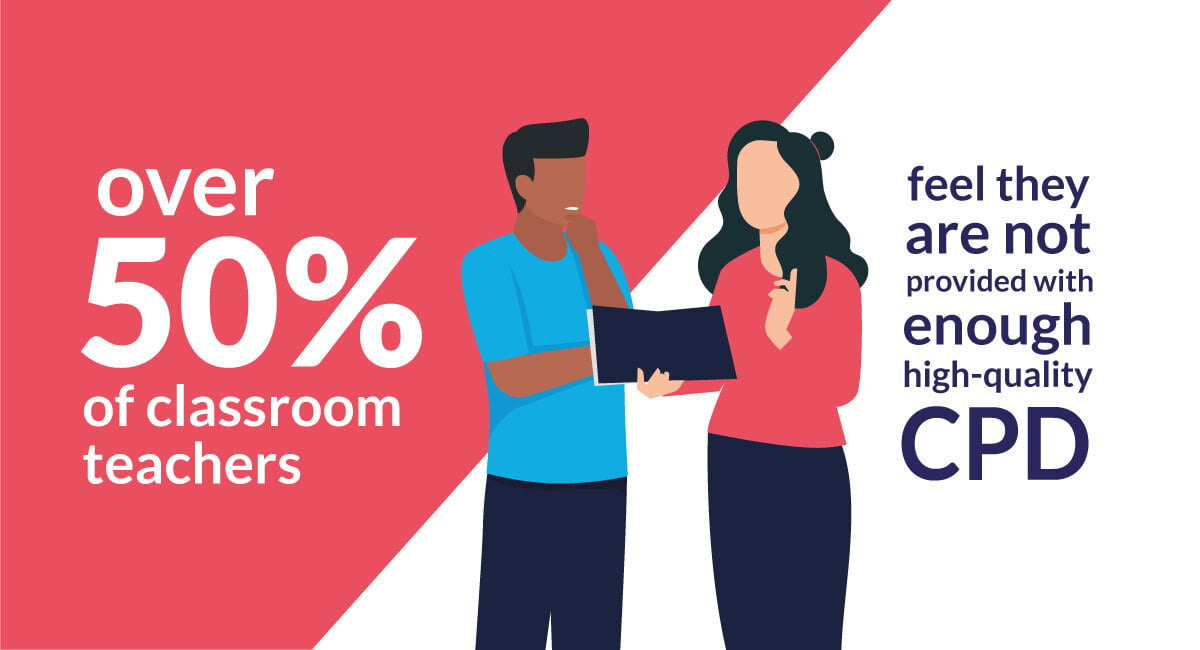The job of a school leader is incredibly challenging, particularly over the last two years and headteachers and their senior leadership teams have worked tirelessly in the face of great adversity to keep their staff and students safe, alongside providing an education for their pupils during a global pandemic. Add to this, the wealth of issues SLTs have had to manage, including staff and pupil illness, last minute changes in guidance, supporting struggling families and the return of full inspections.
This immense workload has been a real balancing act, so it is no wonder then, that the professional development of staff may have fallen through the cracks.

In a recent survey by Teacher Tapp, teachers were asked to comment on the statement: “My school's professional development provision is helping me to become a better teacher.” Only 34% of classroom teachers agreed with this statement, with only 7.6% strongly agreeing. Interestingly, 67% of the headteachers questioned believed that they were providing PD opportunities which helped their teachers become better - this shows a significant gap between their perceptions and their teacher’s experiences. We also recently commissioned a survey with Teacher Tapp which reinforced these findings.
We posed the question to teachers, ‘This academic year, has your school provided you with enough high quality CPD opportunities?’ Over half of classroom teachers (55%) believed that they hadn’t been provided with high quality CPD opportunities, alongside 49% of middle leaders. Again, this was not the case with senior leadership teams and headteachers, who believed that their CPD offering had been much better than their teachers suggested, with 66% of SLT surveyed and 76% of heads suggesting that CPD this year has been high quality. These interesting findings may highlight an unexpected effect of the pandemic.
While newspapers and education experts have been discussing the impact that Covid-19 may have had on the learning of students - and of course, this is a real worry, the impact it has had on staff learning and development may be a bit of a ticking time bomb when it comes to job satisfaction and retention.
Why does it matter?
This is worrying, as professional development is an important part of ensuring that teachers are teaching to the best of their capabilities and as Dylan Wiliam said, ‘the quality of teachers in our classroom is one of the most important determinants of how much children learn in those classrooms, with the very best teachers generating four times as much progress for their students as the least effective’ (William, 2016: 182). This is further reinforced by Zuccollo and Fletcher Wood, who add ‘high-quality professional development for teachers has a significant effect on the effectiveness of teaching.’ (Zuccollo & Fletcher-Wood, 2020).
Professional development opportunities for teachers are absolutely vital and as Zoe and Mark Enser wrote in their blog for IRIS Connect, ‘CPD does and can make a difference to the practice of teachers and the consequent outcomes of pupils.’ In addition to this, teacher professional development links to job satisfaction and both of these have a positive and significant influence on teacher performance (Thahir et al., 2021).
Obviously, we all want to see our pupils progress but it seems that the hectic, high pressure situation schools have found themselves in over the last few years may have become a bit of a barrier to professional development. At a time when many students have missed out on some face to face teaching due to remote learning, ‘enabling effective classroom teaching is the “best bet” in response to the Covid-19 pandemic’ (SecEd, 2021). Therefore, it is important that school leaders not only start to look ahead to their staff’s professional development opportunities for next year but also provide some meaningful learning activities during this half term which are bespoke and tailored to staff needs.
What makes effective PD?
Luckily, we know more about what makes effective professional development than ever, and the evidence from the EEF’s recent guidance report on effective professional development drew together research from across the world, to highlight what schools need to do to ensure their professional development makes a real impact. The report identified that change doesn’t happen overnight and CPD should be developed over time as an iterative process. This is why school leaders need to know their staff and ensure that any development opportunities build on staff’s prior knowledge and avoid cognitive load by bridging the gap between abstract theories and concrete examples, which also relate to their own subject, context or phase.
In addition, giving staff the agency to steer their own professional development can be hugely motivating because they get to choose their areas of interest and the direction of their professional travel, which leads to more motivation; staff feel like CPD is not something that is being forced on them and they are actively involved in the process instead.
An analysis from the National Foundation for Education Research (NFER, 2020) suggests teachers’ feelings of autonomy make a huge difference to their morale and intention to stay in teaching. They conducted a quantitative study with teachers in England and found that autonomy is clearly linked to job satisfaction and retention. Other research has indicated that a collaborative environment, where staff can learn from one another and explore areas of practice together, while being given the time to plan and reflect is just as important as what they learn in the session. This is corroborated by Van den Brande and Zuccollo’s latest report for the Education Policy Institute where they claim that ‘the largest contribution to the total cost of school CPD is staff time’ (Van den Brande and Zuccollo, 2021).
However, it isn’t all bad news.
Another Teacher Tapp survey revealed that 74% of all people surveyed believed that their subject department (or faculty) provided an environment where everyone can improve their teaching, through PD, observations and other collaborations. This is great news and perhaps school leaders could speak to their middle leaders and explore what they are doing within their departments. This good practice could then be used to inform the whole school CPD where possible, while also ensuring that all key stakeholders are involved in steering staff development.
So what else can school leaders do this term which will really make a difference to their staff?
The recent report from the Department for Education, ‘School Recovery Strategies:Year 1 findings’ (2022) may shed some light on what has worked in other schools. One of the main headlines from the report was that teachers valued collaboration highly and felt that sharing good practice and sharing resources had been hugely beneficial. This is one of the key strengths of the IRIS Connect platform, that schools are able to collaborate in our ‘Groups’ tool and share research, video reflections and have professional dialogue with colleagues at a distance. Many of our customers are creating subject or phase specific groups where they are collaborating across a local authority or multi academy trust and this is a really quick, cost effective approach that school leaders could take to facilitate opportunities for their staff.
Sheffield’s Institute of Education (2022) has also recently run a pilot study on how schools can provide high quality CPD for their staff, which found that key staff within a school who act as ‘CPD Challenge Champions’ should have the authority to lead change in the organisation, while liaising with SLT to engage staff. That SLT support is vital and at IRIS Connect, we find our most successful schools have leadership teams who champion the use of our platform’s tools to enhance the CPD they are already doing, rather than using it as an add-on.
The schools in this pilot also talked about the need for flexibility and a range of different ways that staff can access CPD, including online from home, collaboratively and within school. IRIS Connect can be accessed from anywhere, at any time which means it fits around the teacher's other commitments. It also means that CPD is never just a one off session as the vital active ingredients of effective PD - planning, implementation and reflection can all take place using our software.
How we can help
At IRIS Connect, we have been working on our new Practice Exchange CPD programme and our new Pathways: Instructional Coaching and Reflective Practice. Our Pathways are a way of learning, a framework that teachers can follow to help them learn, whether they are working alone or with a coach/mentor.
The Practice Exchange is formed around six key instructional strategies and features snapshots of bitesize theory, collaborative spaces where teachers can have professional dialogue, printable resources and excitingly, video exemplifications of teaching strategies in action in real classrooms, so that you can bridge the gap between theory and practice and deconstruct the active ingredients of effective teaching. It is underpinned by robust evidence and aligned perfectly with the Core Content Framework, the Early Career Framework and new suite of NPQs.
What is even more exciting is that the Practice Exchange also offers teachers the opportunity to upload videos of their own practice, to share with others and contribute to our amazing library of practice. The videos will be anonymised, so that there is no breach of data and tagged so that they can be grouped together with other similar clips. Teachers who contribute to the library will also receive some Etsy vouchers and the schools who contribute more videos will be rewarded with CPD vouchers. These new programmes are all steered by the teacher, who can make them bespoke to their needs and choose what to engage with, based on their priorities. For busy senior leadership teams, this could be a perfect solution to your staff CPD this term as it has been designed for your staff to work independently - we have done the hard work, so you don’t have to.



Leave a comment:
Get blog notifications
Keep up to date with our latest professional learning blogs.